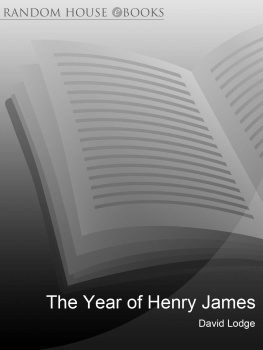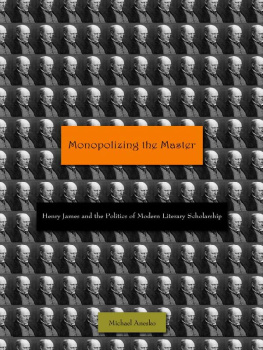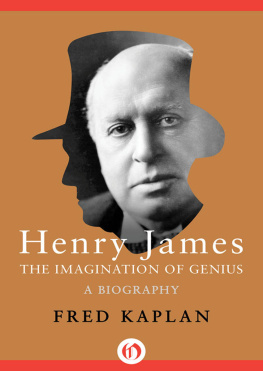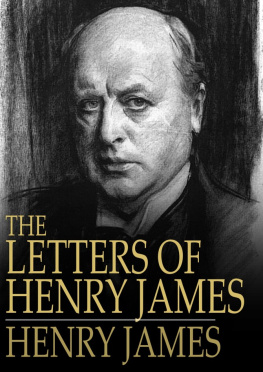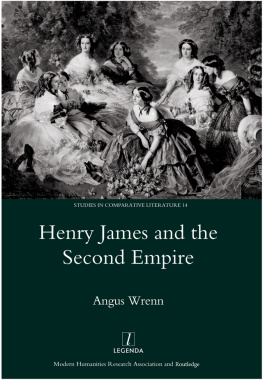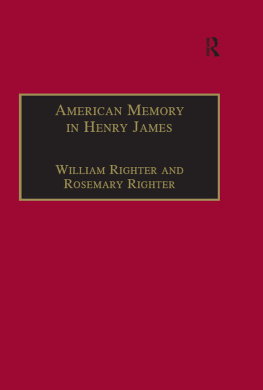Contents
ALSO BY
David Lodge
Fiction
The Picturegoers
Ginger, Youre Barmy
The British Museum is Falling Down
Out of the Shelter
Changing Places
How Far Can You Go?
Small World
Nice Work
Paradise News
Therapy
Home Truths
Thinks...
Author, Author
Criticism
Language of Fiction
The Novelist at the Crossroads
The Modes of Modern Writing
Working with Structuralism
After Bakhtin
Essays
Write On
The Art of Fiction
The Practice of Writing
Consciousness and the Novel
Drama
The Writing Game
Home Truths
To Tom Rosenthal
The Year of Henry James
or, Timing Is All:
the Story of a Novel
With other essays on the
genesis, composition
and reception of literary fiction
David Lodge

preface
The genesis, composition and reception of a novel may be loosely likened to three stages in the life of a human being (very loosely, because literary genesis is usually parthenogenetic). There is a moment of conception, when one of the myriad thoughts that continually stream through the consciousness of a writer penetrates his or her imagination and fertilises it. This is usually described as getting an idea for a novel. Many such ideas quickly die, or miscarry, and are forgotten. Even if they survive to full term, the writer may be unable to recall the precise moment of conception, but sometimes as with several novels discussed in this book we have reliable accounts of when and how it happened. The initial idea, however, always has a pre-history in the writers life, in his experience and in his reading, which it is interesting to try and trace. That is also part of the works genesis, as is the process by which the idea is developed, brooded on and modified, in the writers mind or notebook, before the actual writing begins.
In this analogy, the composition of a novel corresponds to parents nurturing and education of their offspring from birth until the time when the child leaves home and becomes independent of parental control. Much of this compositional work also goes on in the writers head, or in memos to himself in a notebook, as well as in the actual production of the text in a growing pile of numbered pages. One tries to make ones novel as strong, as satisfying, as immune to criticism as one can, a task that usually involves a great deal of rereading and rewriting; but when the novel is published and passes into the hands of other readers it has an independent life which the writer can never fully anticipate or control (though he may of course seek to influence it by commenting publicly on the work or taking issue with his critics). In some, rather rare cases Henry Jamess Daisy Miller being an example a writer may significantly revise and reissue a work of fiction after its first publication, but in that case he has written another work, which will then have its own reception, distinct from the reception of the original.
Reception is a term that covers several different phenomena. It can mean the process by which an individual reader negotiates a text, from sentence to sentence, paragraph to paragraph, chapter to chapter, making sense of it, or producing it, as a fashionable academic jargon says. All descriptive and analytical criticism is this kind of reception in action, and there is a good deal of it in the essays in this volume. Such criticism also, by implication, throws light on the process of composition, since it describes effects of which the author is the conscious or unconscious cause. But reception can also have a more institutional meaning, i.e., the evaluative response of the literary community, the media, and the reading public to a particular book, as measured by reviews, sales, prizes and other evidence. Reception in that sense is a recurrent topic in this book.
The person best qualified to give an account of a novels genesis and composition is the author. He or she is also the person most affected by its reception. In the first part of this book I describe in some detail all three stages in the life of one of my own novels, Author, Author. Such an undertaking obviously risks seeming narcissistic or presumptuous all the more because the novel is about Henry James, whose Prefaces to the New York Edition of his novels and tales probably constitute the most impressive feat of authorial self-examination in the English language. It seemed to me, however, a story worth telling because it had several curious and unusual features, notably the nearly simultaneous publication of several other novels about or inspired by Henry James, a phenomenon which stirred up considerable interest and speculation in the literary world, and had for me personally some painfully ironic consequences. I have called this piece the story of a novel, but it is also the story of a novelist, over a few years of his professional life, and much of it is written in an anecdotal autobiographical mode. I hope that The Year of Henry James may have some general interest and value for the light it throws on the psychology, sociology and economics of authorship in the early twenty-first century, as well as on the creative process itself.
The essays collected in Part Two are more conventional literary criticism. They were written for different occasions (although three of them are published here for the first time), as introductions to reprints, as reviews, and in one case as a lecture, and they do not apply a common or systematic method to the texts they examine. The degree of emphasis on genesis, composition and reception, respectively, varies from one essay to another, though most of them deal with all three aspects of a single novel. Two essays discuss a wider range of texts. The one on Graham Greene focuses on the sources of a writers work in his reading, and also on the way he may use his criticism of other writers to try and influence the reception of his own. The Best of Young American Novelists, 1996 examines a very recent development in the reception of literary fiction, the public listing of meritorious books or authors, usually attached to the award of a prize, which in this case began as a marketing wheeze and then acquired institutional status.
In arranging the order of the contents, it seemed appropriate to follow The Year of Henry James with an essay about one of Jamess own tales, and that with an essay on Wellss Kipps, the reception of which included a notable appreciation by James. After backtracking in time to take in George Eliot, the essays are ordered historically, according to topic. Henry James: Daisy Miller is closely based on the introduction to my forthcoming edition of the novella for Penguin Classics. H. G. Wells: Kipps is substantially the same as my introduction to the Penguin Classics edition of that novel, edited by Simon J. James, published in 2005. The Making of George Eliot: Scenes of Clerical Life is a substantially revised version of the introduction to my edition of the three tales for Penguin Classics, originally published in 1973. Graham Greene and the Anxiety of Influence is the text of a lecture delivered at the Graham Greene Festival at Berkhamstead, October 2004. Vladimir Nabokov: Pnin was written as an introduction to the Everyman Library edition, published in 2004. Umberto Eco:

